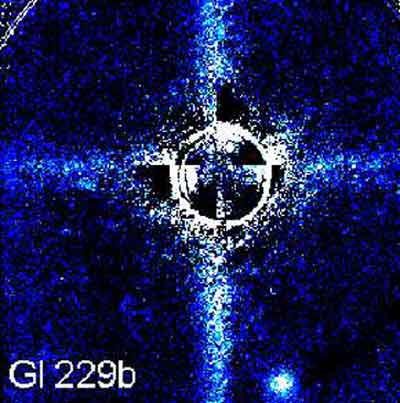Brown Dwarf Gliese 229B

Explanation:
The spot near the bottom is an image of an unusual type of object: a
brown dwarf. A
brown dwarf is sometimes called a "failed star"
because it does not have enough mass to shine by
nuclear fusion.
A
brown dwarf is more massive than a
planet, though, and thought to have formed through stellar-like
nebular condensation.
Brown dwarfs and planets are likely quite abundant,
but usually difficult to see in the glare of brighter stars they orbit.
New
techniques, such as using
coronagraphic masks to block the light of the bright star,
are allowing the detection of these faint stellar companions.
Above, much of the
bright light of central
Gliese 229A
has been blocked and digitally subtracted,
leaving the clearest image yet of
Gliese 229B.
Perfecting techniques like this increases ability
to detect still dimmer Earth-type
planets orbiting
nearby stars.
Authors & editors:
Robert Nemiroff
(MTU) &
Jerry Bonnell
(USRA)
NASA Web Site Statements, Warnings,
and Disclaimers
NASA Official: Jay Norris.
Specific
rights apply.
A service of:
LHEA at
NASA /
GSFC
& Michigan Tech. U.

